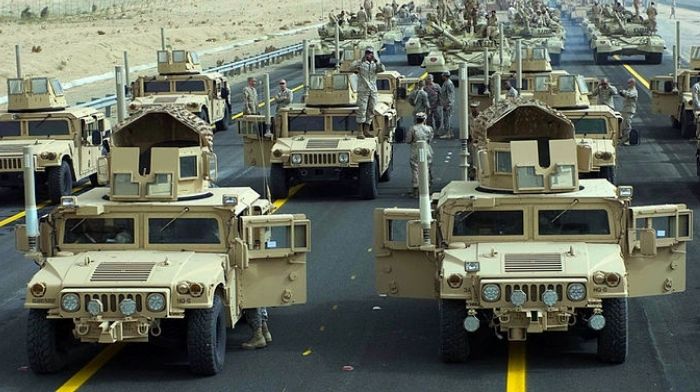Last Tuesday, a $40 billion security-assistance package for Ukraine was approved with a 368 to 57 vote in the House. It’s likely to pass through the Senate this week and be signed by the President.
In a political climate with both parties on extreme sides of the spectrum stagnating progress, the desire to arm Ukraine seems the only thing that brings the parties together.
But should we be more cautious about how much and what we are providing? Unfortunately, the answer is an overwhelming yes.
I defy anyone to read this @RandPaul thread – a summary of the Senate speech he gave – and argue he’s wrong.
Even if you support flooding Ukraine with endless US money and weapons, the amounts are staggering, the risks of escalation severe. Shouldn’t there at least be oversight? https://t.co/eFQQGAnNVy
— Glenn Greenwald (@ggreenwald) May 14, 2022
What’s In The Package
When comparing what we have sent to Ukraine versus what we sent to Afghanistan, Iraq, or Israel, the numbers are staggering. This one emergency bill will make them the recipient of more security assistance in 2022 than we ever sent the countries above.
Included in the funding package are:
- $8.7 billion to replenish U.S. weapons
- $6 billion to train and equip Ukrainian forces
- $3.9 billion for U.S. forces deployed in Europe
The replenishment is undoubtedly urgent because we have given close to a third of our supply of Javelin missiles.
Support Conservative Voices!
Sign up to receive the latest political news, insight, and commentary delivered directly to your inbox.
Undoubtedly thankful for the infusion of taxpayer cash is weapons manufacturer Lockheed Martin, which coincidentally just won a huge contract for Javelin missiles.
Leftists were outraged about Elon Musk spending $44 billion to buy Twitter and not using that money for their socialist demands.
But they have no problem spending $40 billion of your tax dollars on more aid for Ukraine with little direction on where that money will actually go.
— Lauren Boebert (@laurenboebert) May 12, 2022
This puts war planners in an uncomfortable position when it comes to reporting weapons readiness if a war breaks out in another theater… say like Somalia or China.
RELATED: Trump Withdrew American Soldiers From Somalia – Biden Is Sending Them Back
A Veritable Shopping Mall for Merchants of Death
Ukraine has long been known for being a hub for arm-traffickers since the fall of the Soviet Union. According to the Small Arms Survey, Ukrainian’s 7.1 million small arms stock in 1992 “were diverted to conflict areas.”
“It’s a slap in the face to struggling Americans.”
https://t.co/z4jaEu4q6E via @TPInsidr— Rusty ???????? (@rustyweiss74) May 14, 2022
While that might seem far into the distant past, Ukraine has steadily been a sweet spot for these arm-traffickers, also known as Merchants of Death.
Due to its location on the water and port accessibility, ships trafficking weapons to war-torn areas under arms embargoes have been traced back to Ukraine since the early 2000s.
In February 2001, Spain intercepted the Anastasia in Las Palmas in the Canary Islands. The ship was carrying 636 tons of assault rifles en route to Angola, which was in the midst of a civil war.
In December 2007, the Beluga Endurance was captured carrying 10,000 assault rifles, allegedly heading for South Sudan.
Finally, in March 2010, the Romania was stopped heading to the Democratic Republic of the Congo with 10,000 Kalashnikov rifles.
All three ships were eventually traced back to Ukraine.
Between 2006 and 2011, it is estimated that $117 million worth of registered firearms were exported from Ukraine. However, the number is likely underestimated given the extreme difficulty tracing and investigating illicit arms trafficking.
RELATED: Florida Rep. Gaetz Raises Dire Warning On House Floor: ‘America Is Sleepwalking Into A War’
History Repeating Itself
The Pentagon is not known for having the best procedures to track weapons sent to other countries. Between 2001 and 2015, the Pentagon sent more than 1.45 million firearms to various forces in Afghanistan and Iraq.
If Ukraine needs weapons, armored vehicles, black hawk helicopters, etc. can’t they just swing by Afghanistan and pick up the stuff Joe left there?
— Live???????????????? (@22liv22) May 14, 2022
These shipments included over 978,000 assault rifles, 266,000 pistols, and 112,000 machine guns.
It’s been estimated that the Pentagon lost track of 52% of those weapons.
Not to mention the literal tons of advanced weapons and vehicles that were unceremoniously left in Afghanistan for the Taliban to parade around.
There is little reason to believe that we will be able to control, let alone even know, what happens to the weapons provided to Ukraine when this conflict eventually ends.
For that matter, we might not even know what weapons go in in the first place.
While getting verifiable information out of the region is complex, it is reported that mercenaries aren’t just joining the Ukrainian side, but the Russian side as well.
The alleged mercenaries are from places like Libya, Syria, and Chechnya, including some hired guns from the Wagner Group, a Russian contractor. To say that our weapons getting into the hands of anyone from these groups poses a national security risk is an understatement.
RELATED: Jesse Watters Squeezes Lindsey Graham On Fast Moving Ukraine Aid While Americans Are Left Hanging
Uncle Sam Says Don’t Worry
The State Department claims that they’ve conducted thorough vetting of the forces they are sending weapons to in Ukraine. However, it is hard to find that comforting, given their poor performance with vetting during the Afghanistan withdrawal.
But wait, there’s more. They also have mandated that Ukraine sign agreements that they will “…not allow the retransfer of equipment to third parties without prior United States government authorization.”
I know I feel better about this already, don’t you? Besides the fact that there are no teeth behind this loose contract, we aren’t even known for following these same agreements.
We have agreed to transfer a fleet of Mi-17 helicopters to Ukraine that we received from… none other than Russia. We had agreed to a similar arrangement that we are posing in Ukraine.
The vagueness and ambiguity with which the State Department and Department of Defense choose to articulate their efforts should honestly irritate Congress and the American people the most.
Annie Shiel, a senior advisor at the Center for Civilians in Conflict who has been in conversations with both Departments over these shipments, stated:
“It is unclear what risk mitigation or monitoring steps the U.S., and other countries have taken, or what guarantees they have obtained to ensure the protection of civilians through these very large transfers.”
RELATED: ‘MAGA Marjorie’ Taylor Greene Slams Dan Crenshaw For Funding Ukraine While Americans Struggle
A Glimpse Into A Possible Future
Rachel Stohl, an arms-control expert and Vice President of the Stimson Center, echoed what other senior defense officials have been stating regarding the weapons assistance since the beginning of the conflict:
“It’s just impossible to keep track of not only where they’re going and who is using them, but how they are being used.”
Those who have served in the last 20 years know how weapons provided to forces can later be used against them. For example, Stingers given by the CIA to the Mujahideen to beat the Russians later posed a threat to us when we were sent to fight the forever war in Afghanistan.
It is a certainty that the next generation of Americans will fight a war somewhere with our weapons posing a threat to them that we undoubtedly provided in good faith and out of a sense of goodwill to Ukraine.
OPINION: Bloated House $40 billion Ukraine aid package puts Americans last https://t.co/ID1hdt7Bm1
— Fox News (@FoxNews) May 16, 2022
We must break the cycle of bad habits and blind trust in our institutions and start asking serious questions. Or our sons and daughters will fight a war somewhere dodging our own artillery.
Now is the time to support and share the sources you trust.
The Political Insider ranks #3 on Feedspot’s “100 Best Political Blogs and Websites.”























































